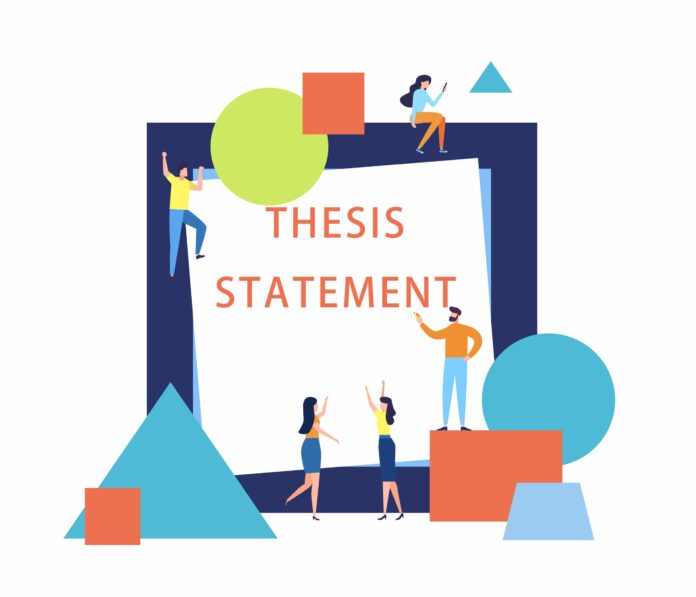
In your life as a scholar, you will be required to convince others in a particular subject that you are studying that the stand you take is interesting and logical. Persuasion is a skill you are going to have to learn. You will often be asked to convince the reader of the document of your point of view, and this will have to follow a predictable pattern. After you have introduced your subject briefly, you will explicitly take your point of view, which is often done in one sentence referred to as the thesis statement. A thesis statement will serve as a roadmap for writing the paper and informing the reader of what he/she should expect from the paper. It would help if you noted that a thesis will be your interpretation of a certain subject or question and is not a discussion of the subject itself. The stand you take on a thesis statement is something that someone else might dispute. Sites like this one offers assistance in developing a thesis statement.
This article will present how you can write a good thesis statement that will encompass the main idea and one that you will be able to support in your write up.
Table of Contents
Have A Good Understanding Of Your Subject

One of the things you need to do as a pre-requisite to writing a good thesis statement is knowing your topic. The topic you choose to discuss should be something that you understand very well or one you can learn about by researching over the internet or in a library. It will be difficult for you to develop a good thesis statement on a topic that you have very little knowledge about. You can also look at topics you have personal experience of as a place you can draw knowledge from.
Be Specific About Your Topic

The second thing you need to do to write a good thesis statement is to be specific about your topic area. A paper will always be limited to a certain number of words or pages, and so this should offer a good guide on how broad or specific you require it to be. A good thesis statement will require you to take this into account so that you can be able to adequately support the thesis statement with the information you have on the subject.
Identify Various Ways To Argue Your Subject
One of the best ways to go about writing a good thesis statement is to look for multiple ways that you can be able to argue your subject down. In other words, you need to brainstorm. Take a pen and paper and jot down all the ideas that come to mind. By doing this, you will be able to discover new ideas and separate different points or even categorize your argument for the thesis statement. This step is going to shape your thesis statement and give stronger arguments.
Write A Thesis Statement

After you have gone through all the pre-requisites to making a good thesis statement, you now need to write the thesis statement as a question. Take the subject of your thesis and change it into a question. Say, for example, your subject of discussion was the United nations. You could come up with a question, Has the UN succeeded in fostering and maintaining world peace? Such a question is important as it will set the stage for you to pick a stand on the subject.
Answering The Question
At this stage, what you need to do is answer the question. This will be you giving a direct opinion on what you think about the answer subject matter with regard to the question you set for yourself. You could answer the question in the affirmative or the negative. Always have at the back of your mind when you are answering the question that you will be required to defend the position you take. The research that you generated will be crucial in determining the stand that you are going to take.
Pick An Answer

At this point, you will need to pick an answer to your question. Now go back to all the ideas you wrote on the various stands that you could take and how you would discuss this stand. After you have reviewedthe ideas, take the position that you feel most comfortable with and one that you can effectively discuss. Pick your main answer after this.
What Next After An Affirmative Or Negative Answer
You will still need to keep referring to the referring question and the various ways you came up with how you are going to argue your thesis statement. Identify at least three good reasons for the answer and combine these with your statement. Remember that a thesis statement is,in fact, a statement that is about a sentence. So, make sure that your position on the subject is clearly known. Do not let the reader wonder what your stand on the subject is.
Emphasizing On The Thesis Statement

If you follow the steps above,you will already have written a good thesis statement by now. But to even take it a step above. One way to do this is by showing how your view differs from the common view or the view of other people. Precision is key as you do not have a lot of room to write a lot when declaring a stand in your thesis statement. Using words like ‘in truth’ or ‘in reality’ will help emphasize and ultimately come up with a good thesis statement.
Determining If The Thesis Statement Is Good
After you are done, you need to take a step back and evaluate if the thesis statement is actually as good as you think. Of course, if you followed the step above, you will have nothing to worry about, but just in case you are in doubt, askyourself if you can answer the question effectively. If you re-read the question that you set as a thesis statement, you may be able to identify flaws in it and fix arguments outside of the thesis statement.
Can My Position Be Opposed?

If other people can oppose the thesis statement and justify the position you have taken, you are in the right. If one cannot oppose your view, then that indicates a problem; you have either just stated the fact of your subject of discussion, or what you have done is summarized the topic of your discussion.
Is Your Thesis Statement Specific?
You need to ask yourself if your thesis statement specif. A broad thesis statement will do you no good when it comes to an argument. You will have weak arguments to support the whole write up. You want to be specific so that your arguments are very specific to the thesis statement.





